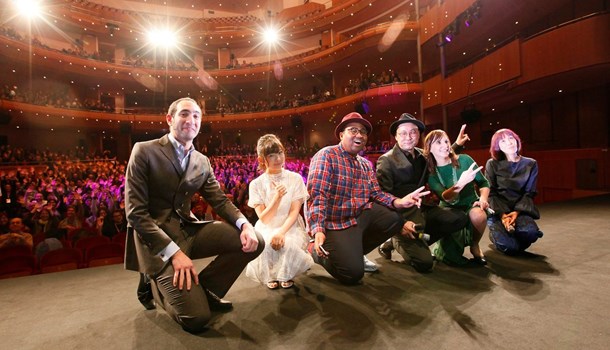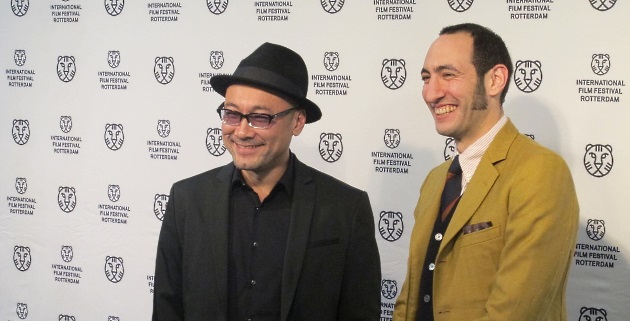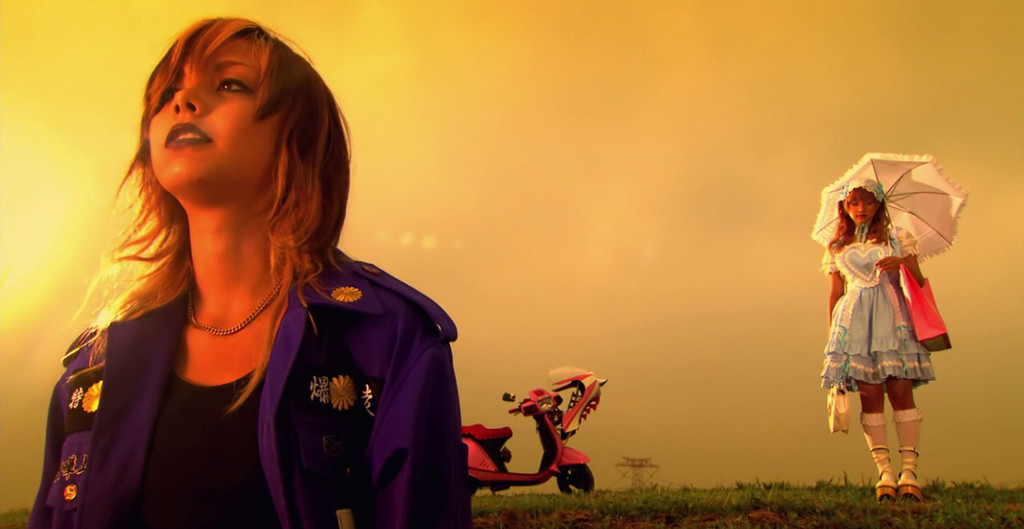
Written by Richard Durrance on 20 Dec 2022
We've enjoyed a year with many excellent films released by Third Window Films, whether they've been 2022 releases such as the superb Obayashi at Kadokawa boxset and Summer Time Machine Blues, or catching up on some of their older releases like 9 Souls.
I reached out to the head of Third Window Films, Adam Torel, to catch up on the latest developments and learn about the history of Third Window (which has been steadily releasing titles for 17 years) and find out about his life as a producer of independent Japanese film. Being a gracious soul, Adam happily provided us his unique insight.
Richard Durrance: Many thanks, Adam, for agreeing to take our questions. And so, without further ado and forgiving the frivolous nature of my first question, why the name Third Window?
Adam Torel: Along with movies, my big passion is music, specifically collecting northern and modern soul records. Around the time I started Third Window Films (in 2005), I was really into more ‘classic’ northern soul and I loved the song ‘Third Window from the Right’ by Dean Barlow. That’s where the name ‘third window’ came from, and the first few years of releases actually included a snippet of the song in the animated logo at the front [RD: that I certainly remember]. Though actually, my music tastes started to focus more on ‘modern’ soul over the years and I since sold my Dean Barlow record (I don’t particularly like the song anymore)!
RD: In previous years you released films from a wider range of East Asian countries. Was there any particular reason why in recent years you’ve focussed solely on Japanese cinema?
AT: Before I got into distribution I personally was really on a high of Korean cinema, as had been following it (as well as buying Korean DVD's of all types of cinema) religiously since 1997. When I started off I put a lot into distributing Korean films and also thought they (and HK cinema) would ‘travel’ better than Japanese cinema as they’re glossier and a little more ‘obvious’. Though that also coincided with a time when Korean cinema was getting a little stale and HK cinema had fallen off a cliff, and the over saturation of both in the UK market had really damped the mood for distributing those types of films. So, instead of focusing on titles which seemed more obvious to ‘sell’ (like Korean and HK action), I just decided to focus on a gut instinct of titles which I personally was really into at the time (Japanese quirky comedies). The Japanese quirky comedies took off (films like Kamikaze Girls, Turtles are Surprisingly Fast Swimmers, etc) and I stuck with them. I also moved to Japan in 2012, so that’s probably the main reason why I focused on Japanese cinema, as it was a lot easier to work with being based there.
RD: When considering films to release, what influences your choices? How do you balance films and filmmakers that you are passionate about with what you think will sell?
AT: As a record collector and DJ, I’d rather play rare and unknown tracks non-stop at a club, but that would be aimed at myself and a very small audience, killing the dance floor dead. In order to get people to dance to an unknown record, you first need to get them on the dance floor and in the mood then you can drop in some tracks they would not have heard before, but would definitely stick with as they’re already in the mood and dancing. That’s the same with distribution I guess. I’d love to release just unknown and minor titles non-stop, but then they would become harder and harder to sell, so a balance of major and obvious titles mixed with unknowns is necessary.
RD: For many years in the UK it has felt like Japanese cinema has relied on a small number of independent distributors; many have fallen by the wayside over time; some release Japanese films alongside a more varied slate, like Arrow Films, meaning that now Third Window is one of the premier proponents of Japanese cinema. Considering you’ve been in the game quite some time now, how do you manage to keep going? Especially considering the age-old theory that physical media is dead. (PS it’s not dead for many of us, myself included.)
AT: It mainly just comes down to the fact that Third Window is essentially a one-man operation. No real staff (except my flatmate who helps with press on the side to her main jobs) with the majority of work done in-house (except for the bluray authoring side, handled by a long-time friend in Andrew Kirkham) and no office or other overheads. Companies like Arrow are big studios with a large workforce and big overheads, so they need to release major titles to keep going, but I don’t really have any of that and therefore can continue as I have. Saying that, it has gotten harder and harder over the years with costs going up and sales going down, and I guess that’s why I’m not able to release as many small titles as I used to. The physical market has actually gotten relatively stronger of late, thanks in part to companies like Arrow, but at the same time it’s still super niche and requires more effort into making ‘collectors editions’, which can only be done for more ‘obvious’ titles.
RD: On the topic of Arrow Films, from the outside it seems like they are helping to support distributors like Third Window, selling your films as well as those from other niche distributors via their web shop, equally in your newsletter you frequently promote their releases. Can you share any insights as to how independent distributors act to support one another?
AT: I can’t really say they’re ‘supporting’ distributors like myself to be honest. They’re taking a massive cut of sales in order to sell mine (and other labels) on their web shop. They’ve obviously changed over the years, being acquired by a conglomerate and many of their original staff leaving, plus they’re even more corporate and cut-throat than before, but that can’t be helped. The market is much tougher and they’re a business with lots of costs to cover, so it’s pretty amazing they’re able to still do some of what they were originally setup for, all things considered.

Adam Torel on the festival circuit promoting Lowlife Love
RD: As I am someone who watches too many films but to whom licensing and distribution is alien, how do you start considering which films you might want to release, and when you settle upon a title what is process that allows for this is happen? What are the discussions and negotiations that take place that make your desire to distribute a reality?
AT: Usually I tend to watch films where I think there may be the possibility to acquire it. For example, I don’t watch many Kore-eda or big studio films as I know that even if I loved it, it would just be a sort of waste of time as there’s no way I could release it. So I tend to pick films based on the studio that produced them, or mainly just trying to find non-studio, independent films which stick out and have something unique about them. The negotiations and such all have to do with the size of the other party and how much competition is involved. For the recent Obayashi Kadokawa set, that took a literal year of negotiations because they were with a massive studio and contracts were dozens of pages long. In other cases, with independent films, it can be done in 5 minutes. Obviously, the Obayashi films have a much larger reach, hence the extra work required, but sometimes it’s just not worth the stress. Japanese companies are legendary a pain to work with for Westerners…
RD: In recent years you’ve branched out into producing films, such as Tezuka’s Barbara, how do you become involved in or initiate these projects? Can you shed some light on what your role is?
AT: Tezuka’s Barbara was a project that its director Macoto Tezka had brought to me many years ago, but the project initially had lots of problems (its main producer had died suddenly) and I passed on it. Though, after working with Tezka to remaster and re-release his debut ‘The Legend of the Stardust Brothers’, I circled back around with him on Barbara and the project took off. In the case of Barbara, it was quite a big film, so I was one of 3 producers working on it and therefore our workloads are split into certain categories, yet in the cases of the smaller films I had done before such as ‘Lowlife Love’ or ‘Love and Other Cults’, they were films in which I worked on them non-stop for about 2-3 years each. For the smaller films I’ll work on almost every single aspect of the process, from pre-production with the script development to casting, through to the film’s production (even to things like filming the "Making Of" extras) then all aspects of post-production - world sales, distribution (both in Japan and overseas), marketing, etc. In all cases, I tend to produce films with directors I like both personally and their filmmaking ‘sense’, and I always first distribute their previous films overseas to build up an audience before making a new film together.
RD: I remember how, in my twenties, you could still go to a multiplex and watch a film like Shinya Tsukamoto’s Vital on general if limited release (and I did, dragging my friend down to the now defunct Trocadero Cineworld), now mainly only those films that are seen as premier titles get a cinematic distribution. Recognising you released ONODA: 10,000 Night in the Jungle in the cinema this year, what future do you see for a wider variety of Japanese and East Asian cinema on the big screen in the UK? What can we do to make it more appreciated by, and accessible to, mainstream audiences?
AT: Obviously back in the days there wasn’t streaming, and if you wanted to see a film you’d have to see it on the big screen. Nowadays, anybody can watch anything at anytime (both legally and not), so it has made ‘going to the cinema’ less exciting (and less of a necessity). So it’s tougher for both cinemas and distributors. Fewer cinemas are willing (or able) to take chances on titles, and therefore distributors will also focus more on more obvious titles. For ONODA, that was a Cannes competition title, and really something made for the big screen, but it totally bombed at the box office and just another reason for both myself and cinemas to think again about taking risks on smaller titles.
RD: Do you think watching Japanese cinema requires a different mindset to watching say Hollywood cinema? Similar to how watching silent cinema takes a mindset shift but silent and Japanese (or silent Japanese) cinema are extremely rewarding and entertaining experiences. If so, what can we do to help viewers appreciate a more diverse cinematic experience?
AT: Yeah I think so, much more than for other Asian cinema such as Korean or HK, which do have one-eye on the West. Since Japanese cinema is so focused on its own market, they’re much less of what we’re used to as Westerners (i.e. production values) and it can make them a little harder to get into. Saying that, the majority of Japanese cinema is not so great, especially the studio titles, but there’s a lot of interesting and unique films under the surface.
RD: Are there any particular directors, or films, you would like to see more widely distributed and or appreciated in the West? (And what can we do to get them over here?)
AT: There are a lot of great independent films which are out there, but not really possible for the physical market in which I mainly operate in. Luckily there are some new streaming projects such as TodoiF, Sakka or even JFF+ which are helping to get independent films out there.
RD: You’ve already teased that 2023 will herald more films by Katsuhito Ishii, and starring Tadanobu Asano, any further clues to what 2023 will bring us courtesy of Third Window Films?
AT: Working on a similar project to the Toshiaki Toyoda box with Katsuhito Ishii, which would also include his more unknown titles and lots of exclusive content. We're also working with Sogo Ishii to try and get more of his titles out there (though it’s very complicated!). Otherwise, trying to find some small and interesting indies to put out.
RD: Many thanks, Adam, for your time. Finally, are there any aspects which sites like UKA that review your releases can do to further support distributors of films like Third Window?
AT: All reviews and social media posts are much appreciated, thanks!

Kamikaze Girls - one of Third Windows earliest (and best!) releases.

Long-time anime dilettante and general lover of cinema. Obsessive re-watcher of 'stuff'. Has issues with dubs. Will go off on tangents about other things that no one else cares about but is sadly passionate about. (Also, parentheses come as standard.) Looks curiously like Jo Shishido, hamster cheeks and all.
posted by Caitlyn C. Cooper on 02 Feb 2026
posted by Caitlyn C. Cooper on 31 Jan 2026
posted by Ross Liversidge on 30 Jan 2026
posted by Ross Liversidge on 27 Jan 2026
posted by Guest on 24 Jan 2026
posted by Ross Liversidge on 12 Jan 2026
posted by Ross Liversidge on 12 Jan 2026